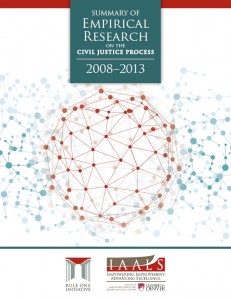New Publication Summarizes Empirical Research on the Civil Justice Process
 Prior to issuing the 2009 “Final Report” containing proposed principles for improving the civil justice process, IAALS and the ACTL Task Force on Discovery and Civil Justice engaged in extensive background research to help define observed problems in the system—problems that decrease access to the judicial process, such as unnecessary cost and excessive delay. This work sparked a national conversation about the future of our civil justice system, further research on the litigation process by a number of individuals and organizations, and the establishment of numerous pilot projects in state and federal courts around the country.
Prior to issuing the 2009 “Final Report” containing proposed principles for improving the civil justice process, IAALS and the ACTL Task Force on Discovery and Civil Justice engaged in extensive background research to help define observed problems in the system—problems that decrease access to the judicial process, such as unnecessary cost and excessive delay. This work sparked a national conversation about the future of our civil justice system, further research on the litigation process by a number of individuals and organizations, and the establishment of numerous pilot projects in state and federal courts around the country.
These efforts are ongoing, and there is much more to come in the next few years and beyond. Nevertheless, it is useful to pause and take stock of the data collected, analyzed, and disseminated since 2008, the onset of the Task Force's work. As procedural decision-makers work to shape the course of civil justice to come, they will be asking, “Where do we go from here to create a just, speedy, and inexpensive process?”
We challenge decision-makers to ask a related question: “What have we learned in the last five years?”
To help make sense of the latest research and to bring it down to a manageable size, we have created a Summary of Empirical Research on the Civil Justice Process: 2008–2013. This report provides a synthesis of the relevant empirical research conducted by a variety of organizations and individuals, including IAALS, the Federal Judicial Center, the National Center for State Courts, the RAND Corporation, and others. It encapsulates the findings from 39 separate studies into a readable compendium, organized by topic for ease of reference (generally following how a case moves through the civil court process, but also including aspects that span all phases of litigation).
We hope this new report will prove to be an asset to those engaged in the study and improvement of the American civil justice process. To be effective, changes should be empirically based to the extent possible, making the collection and absorption of the research absolutely essential. As empirical research on the civil justice process continues, our intent is to update this publication periodically. All comments and feedback are most welcome.




